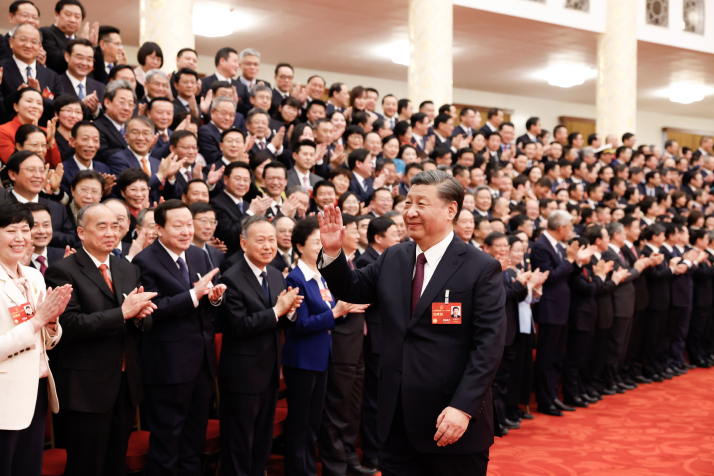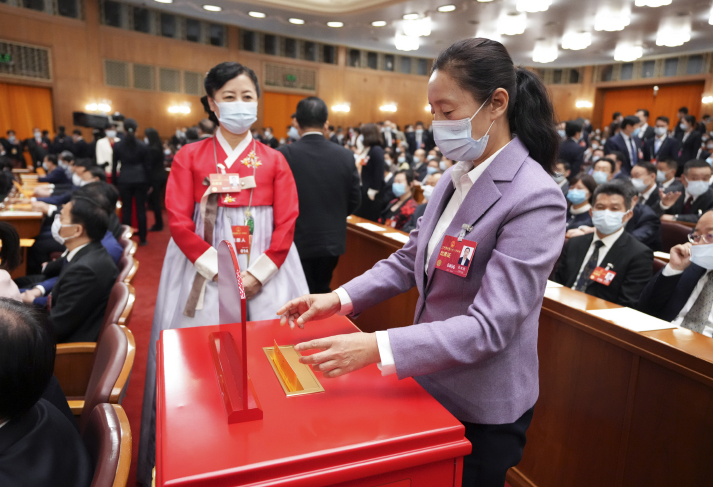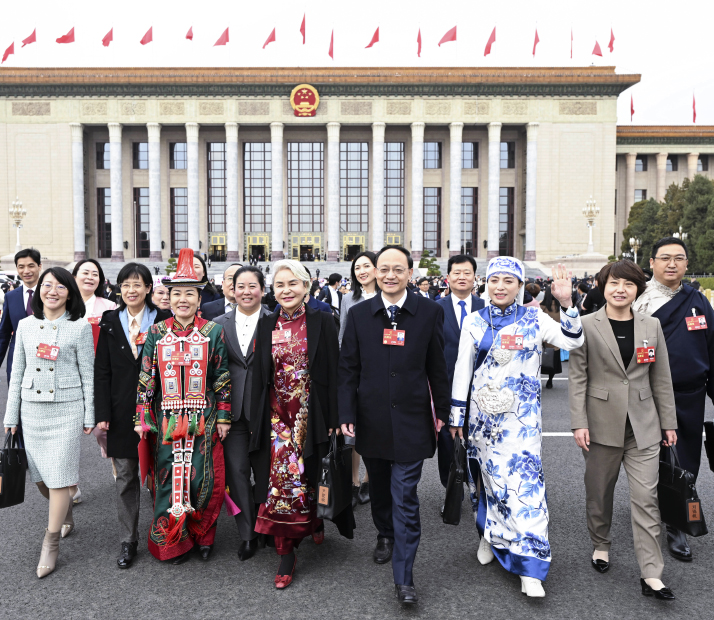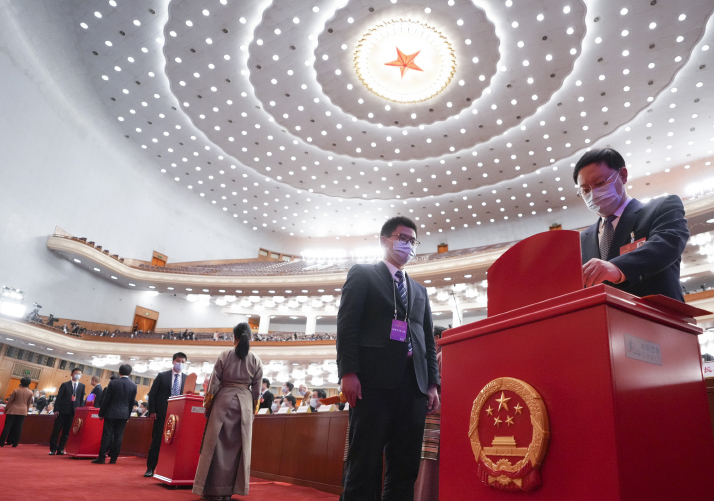| China |
| New leadership poised to guide the country on a journey toward modernization | |
|
|
 Chinese President Xi Jinping, also General Secretary of the Communist Party of China Central Committee and Chairman of the Central Military Commission, waves to deputies to the 14th National People's Congress (NPC) at the Great Hall of the People in Beijing on March 13. Xi and other Chinese leaders met with the deputies and had group photos taken with them after the conclusion of the annual legislative session that same day (XINHUA)
About five months after his reelection as general secretary of the Communist Party of China (CPC) Central Committee, Xi Jinping won his third term as Chinese president at the First Session of the 14th National People's Congress (NPC), the national legislature, which concluded on March 13.
At the session, Xi was also elected chairman of the country's Central Military Commission (CMC). Assuming the top posts in the Party, the state, and the armed forces, Xi is leading the country and its 1.4 billion people on a new journey to modernization. Wrapping up the session, Xi delivered a closely watched speech to a gathering of nearly 3,000 lawmakers. "The people's trust is my biggest motivation moving forward and is also a weighty responsibility on my shoulders," Xi said. Xi announced that the central task of the entire Party and all Chinese people, from this day forward to the middle of the century, is to turn China into a great modern socialist country in all respects and advance national rejuvenation on all fronts. "The relay baton has been passed on to our generation," he said.  A deputy casts a vote during the NPC at the Great Hall of the People in Beijing on March 12 (XINHUA)
Rise to the challenge Born in 1953, Xi joined the CPC in 1974, and became the Party branch secretary of Liangjiahe, a small village in rural Shaanxi Province later that same year. He then worked in different places and rose from the grassroots level to the helm of the Party and the state. Xi was first elected general secretary of the CPC Central Committee and named chairman of the CPC CMC in November 2012. He was elected Chinese president and chairman of the CMC of the People's Republic of China in March 2013. When Xi was first elected as general secretary in 2012, around 100 million rural Chinese were living under the poverty line of 2,300 yuan ($334) per year at 2010 constant prices. In less than a year, Xi put forward the "targeted poverty alleviation" strategy and over the span of about eight years, sent 255,000 work teams and 3 million cadres to villages, providing one-on-one assistance to impoverished farmers. On February 25, 2021, Xi announced that absolute poverty had been eliminated in China. Another challenge was corruption. Upon taking the Party's top office in late 2012, Xi cautioned that "if corruption is allowed to spread, it will eventually lead to the collapse of the Party and the fall of the state." Less than a month into the job, he fired the first shot in his war against corruption. Over the course of 10 years, high-ranking "tigers," including a former member of the Standing Committee of the Political Bureau of the CPC Central Committee, were taken down. Over 500 centrally administered officials, most of whom were at or above the ministerial level, were investigated. Crooked officials who fled overseas were brought back through anti-corruption operations initiated by Xi. In 2018, he announced an "overwhelming victory" against corruption had been achieved. The success of poverty alleviation and anti-corruption has won Xi popular support, but this is not the only reason he was unanimously elected into the top office of the Party and the state. In the past decade, many longstanding problems in the country were solved under his leadership. China has steadily developed and become stronger overall, with an average annual economic growth of 6.2 percent over the past decade, more than twice the global average. Per-capita GDP has doubled to over $12,000. China's share of the world economy has increased from 11.3 percent in 2012 to 18.5 percent at present. The output of grain has consistently been abundant. In the past, China's manufacturing industry was often described as "big but not strong." Today, China has developed its own large passenger aircraft, and technological advancement contributes over 60 percent to the country's economic growth. China's digital economy is the second largest in the world, and its new-energy vehicle production and sales have ranked first for eight consecutive years. In the past 10 years, while eliminating absolute poverty, China has built the world's largest education, social security and healthcare systems. The life expectancy of the average Chinese increased to 78.2 years in 2021, about four years higher than a decade ago. The average concentration of small particles, PM2.5, in the air has decreased for nine consecutive years in major cities, with a cumulative reduction of 57 percent. The once-common occurrence of smog enveloping the skies of north China has now become a rare sight. Xi pushed for green development as he tackled pollution across the board. He announced China aims to peak carbon emissions before 2030 and achieve carbon neutrality before 2060. He also pushed for the ratification of the Paris Agreement on climate change. Also thanks to his efforts, China was among the first to sign the Regional Comprehensive Economic Partnership—the world's largest free trade agreement—and has expanded its free trade pilot zones from one to 21. Xi made the decision to enshrine the statement of allowing the market to play a decisive role in resource allocation and letting the government play a better role into the CPC Constitution and other Party documents, and led the establishment of the National Commission of Supervision (NCS), a powerful anti-corruption agency, to oversee every single person in public office. In late 2012, Xi initiated the eight-point decision on improving conduct. This is considered as a lasting institutional solution to problems such as wasting funds, as well as extravagant spending. A milestone CPC resolution adopted in 2021 states that the Party has affirmed Xi's core position on the Party Central Committee and in the Party as a whole, and affirmed the guiding role of Xi Jinping Thought on Socialism with Chinese Characteristics for a New Era. "It sends a very strong message to the rest of the world that China is united, China is behind one leadership, China is going to be achieving things in a unified way against the backdrop of huge division in Europe and the United States. China is showing the world that there is no division, there is a unified voice and everyone is working together for a common purpose," Laurence J. Brahm, a senior international fellow with the Center for China and Globalization, a nongovernmental think tank based in Beijing, commented on the election of the new leadership in an interview with Xinhua News Agency published on March 15.  Deputies leave the Great Hall of the People after the closing of the First Session of the 14th NPC on March 13 (XINHUA)
Fresh lineup
More than 2,900 national lawmakers exercised their constitutional right to elect China's state leadership during the just-concluded session of the NPC. At the same time, over 2,100 members of the National Committee of the Chinese People's Political Consultative Conference (CPPCC), the country's top political advisory body, elected their own leadership. The CPPCC is a specialist consultative institution that provides advice on state governance by pooling wisdom from a wide spectrum of Chinese society. On March 10, lawmakers elected Zhao Leji as chairman of the 14th NPC Standing Committee and Han Zheng as vice president of China. Wang Huning was elected chairman of the 14th National Committee of the CPPCC that same day. The candidates for premier and CMC vice chairpersons and members were nominated by the Chinese president and CMC chairman. The candidates for director of the NCS, president of the Supreme People's Court (SPC), the nation's highest court, and procurator general of the Supreme People's Procuratorate (SPP), which mainly deals with public prosecution and the supervision of criminal investigation, were nominated by the presidium of the First Session of the 14th NPC. Candidates for leadership positions—including the president—were earlier proposed by the CPC Central Committee to the presidiums of the NPC and CPPCC National Committee sessions. The presidiums are executive committees that preside over the sessions. The lists of candidates were formulated based on extensive consultation and due procedure. Li Qiang was endorsed as Chinese premier on March 11. Zhang Jun was elected president of the SPC that day, Ying Yong was elected procurator general of the SPP and Liu Jinguo was elected director of the NCS.  An NPC deputy casts a vote at the Great Hall of the People in Beijing on March 11 (XINHUA)
Improving legislation To improve the legislative system and comprehensively advance law-based governance, the 14th NPC adopted a revision to the Legislation Law at the closing meeting of its first session on March 13. The Legislation Law was adopted in 2000 by the Ninth NPC, and amended for the first time in 2015 by the 12th NPC. The new amendment entered into force on March 15. The amendment highlights the implementation and oversight of the Constitution as well as promoting whole-process people's democracy to better protect human rights and social fairness and justice. Ahead of the opening of the session, Wang Chao, spokesperson for the First Session of the 14th NPC, said that efforts have been made during the revision of the law to make sure that every link in the legislative process reflects the people's voices and realities at the grassroots level. The amended law has clarified the role of local legislative outreach offices in soliciting grassroots opinions on draft laws and legislative work. "Setting up local legislative outreach offices is an important institutional innovation in China's legislative work in recent years. The amendment stipulates that the working bodies of the NPC Standing Committee should set up local legislative outreach offices in light of actual needs to solicit opinions from the most basic social level and people from all segments of society," Fu Yucheng, an associate professor with the School of Government of the University of Chinese Academy of Social Sciences, told Beijing Review. On improving the legislative procedures and working mechanisms of the NPC and its standing committee, the amended law features detailed requirements of the constitutionality review and the recording and reviewing systems for legislations and normative documents. In particular, the amendment requires a bill's explanatory document to include opinions on issues of constitutionality, and calls on the NPC Constitution and Law Committee to explain issues of constitutionality involved after reviewing a bill. On local legislative work, the amendment pledges to expand the legislative power of cities with subsidiary districts to include affairs pertaining to primary-level governance. Fu said this means cities with subsidiary districts have been given more flexibility in carrying out social governance according to local conditions. (Lu Yan contributed to this article) (Print Edition Title: Fresh Momentum for Development) Copyedited by G.P. Wilson Comments to jijing@cicgamericas.com |
|
||||||||||||||||||||||||||||||
|
